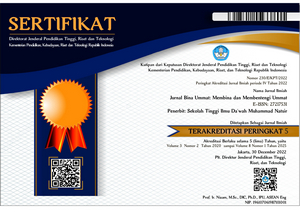ISLAMIC ECONOMIC STRATEGY FACES GLOBAL RECESSION IN THE PERSPECTIVE OF DAKWAH
STRATEGI EKONOMI ISLAM MENGHADAPI RESSESI GLOBAL DALAM PERSEPEKTIF DAKWAH
DOI:
https://doi.org/10.38214/jurnalbinaummatstidnatsir.v6i2.192Keywords:
Sharia Economics; Da'wah; Global Recession.Abstract
The threat of a global economic recession in 2023 is a concern for many countries, including Indonesia, which is affected by the continuing conflict between Ukraine and Russia. Food crises and budget deficits are serious problems in various countries today. The Financial Services Authority (OJK) reports that economic recessions generally occur when gross domestic product (GDP), unemployment rate, and economic growth decline for two consecutive quarters. In addition, inflation is inevitable, and central banks in various countries are also raising interest rates aggressively. All this resulted in major problems that would be difficult to overcome without the concept of Islamic economics. To understand the concept of Islamic economics, massive da'wah efforts by da'is are needed. They must continue to improve their understanding of Islam, both in terms of ubudiyah and muamalah. Their da'wah material is expected to be an inspiration and solution to overcome various problems faced by the people. The purpose of da'wah is to change people's attitudes and behavior for the better, both individually, family, and society, so that their way of thinking and way of life change for the better. In the economic context, the balance between supply and demand, the circulation of money as a medium of exchange, and the production activities of basic necessities are important keys. Islamic economic da'wah promotes this balance and promotes economic justice. The role of the Islamic economy is expected to be an intermediary in production activities, so that the real sector of the economy can run balanced and fair, even in the face of economic crisis or recession.
Published
Issue
Section
This work is licensed under a Lisensi Creative Commons Atribusi 4.0 Internasional.
Authors who publish with this journal agree to the following terms:
- Authors retain copyright and grant the journal right of first publication with the work simultaneously licensed under a Creative Commons Attribution License that allows others to share the work with an acknowledgment of the work's authorship and initial publication in this journal.
- Authors are able to enter into separate, additional contractual arrangements for the non-exclusive distribution of the journal's published version of the work (e.g., post it to an institutional repository or publish it in a book), with an acknowledgment of its initial publication in this journal.
- Authors are permitted and encouraged to post their work online (e.g., in institutional repositories or on their website) prior to and during the submission process, as it can lead to productive exchanges, as well as earlier and greater citation of published work (See The Effect of Open Access).




